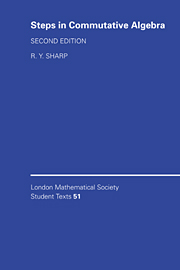Book contents
- Frontmatter
- Contents
- Preface to the 1st Edition
- Preface to the 2nd Edition
- 1 Commutative rings and subrings
- 2 Ideals
- 3 Prime ideals and maximal ideals
- 4 Primary decomposition
- 5 Rings of fractions
- 6 Modules
- 7 Chain conditions on modules
- 8 Commutative Noetherian rings
- 9 More module theory
- 10 Modules over principal ideal domains
- 11 Canonical forms for square matrices
- 12 Some applications to field theory
- 13 Integral dependence on subrings
- 14 Afflne algebras over fields
- 15 Dimension theory
- 16 Regular sequences and grade
- 17 Cohen–Macaulay rings
- Bibliography
- Index
11 - Canonical forms for square matrices
Published online by Cambridge University Press: 06 January 2010
- Frontmatter
- Contents
- Preface to the 1st Edition
- Preface to the 2nd Edition
- 1 Commutative rings and subrings
- 2 Ideals
- 3 Prime ideals and maximal ideals
- 4 Primary decomposition
- 5 Rings of fractions
- 6 Modules
- 7 Chain conditions on modules
- 8 Commutative Noetherian rings
- 9 More module theory
- 10 Modules over principal ideal domains
- 11 Canonical forms for square matrices
- 12 Some applications to field theory
- 13 Integral dependence on subrings
- 14 Afflne algebras over fields
- 15 Dimension theory
- 16 Regular sequences and grade
- 17 Cohen–Macaulay rings
- Bibliography
- Index
Summary
This is just a short chapter, the aim of which is to indicate to the reader how the direct-sum decomposition theorems of Chapter 10 can be used to derive some basic results about canonical forms for square matrices over fields. It is not the intention to provide here an exhaustive account of the theory of canonical forms, because this is not intended to be a book about linear algebra; but the reader might like to see how the ideas of this book, and in particular those of Chapter 10, can be brought to bear on the theory of canonical forms. None of the material in this chapter is needed in the remainder of the book, so that a reader whose interests are in other areas of commutative algebra can omit this chapter.
Square matrices with entries in a field K are intimately related with endomorphisms of finite-dimensional vector spaces over K.
11.1 Definitions and Remarks. Let M be a module over the commutative ring R. An R-endomorphism of M, or simply an endomorphism of M, is just an R-homomorphism from M to itself. We denote by EndR(M) the set of all R-endomorphisms of M. It is routine to check that EndR(M) is a ring under the addition defined in 6.27 and ‘multiplication’ given by composition of mappings: the identity element of this ring is IdM, the identity mapping of M onto itself, while the zero element of EndR(M) is the zero homomorphism 0: M → M defined in 6.27.
The reader should be able to construct easy examples from vector space theory which show that, in general, the ring EndR(M) need not be commutative.
- Type
- Chapter
- Information
- Steps in Commutative Algebra , pp. 208 - 219Publisher: Cambridge University PressPrint publication year: 2001

